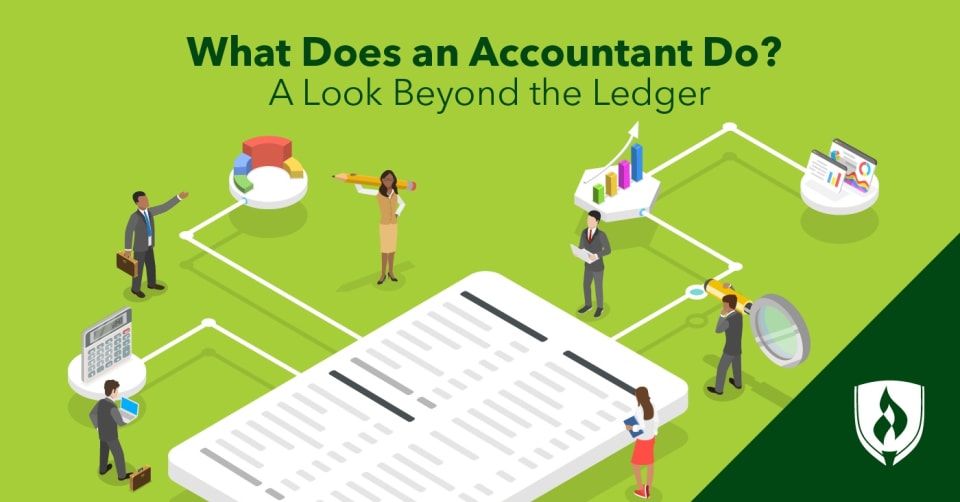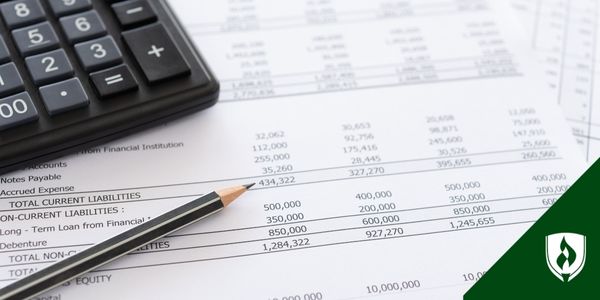
There are certain connotations many pair with the idea of working as an accountant. The mere mention of the word “accounting” in conversation likely triggers images of endless spreadsheets and complex equations, long hours behind a desk during tax season, or the influx of phone calls from loved ones (or even just distant acquaintances) seeking financial advice.
While many might jump to the conclusion that this is a dull career, accountants would beg to differ! In fact, many consider their jobs to be anything but boring, pointing toward the exciting opportunity they have to get a behind-the-scenes look at how an organization functions. It’s as if accountants are fluent in a language that allows them to understand the business culture as a whole.
“Being an accountant requires in-depth and rigorous training, which has also really helped me in my personal life,” says Gemma Roberts, financial accountant and founder of The Work Life Blend. “Having the knowledge and skills to understand financial concepts and apply them to your own situation is empowering.”
It may also surprise you to learn that accountants have an array of areas in which they can specialize. If you’re intrigued by the industry but not quite ready to commit to a career, you can sleep easy knowing that a career in accounting offers several options.
Roberts loves the variety of options in accounting. “It’s so broad, and there are so many different types of roles.” She explains that accountants could spend time preparing accounts to meet regulations, but they could also focus on more commercial aspects of a business, sit in on meetings, test out new products and improve profit margins. “There are so many possibilities!”
If you’re the least bit curious about this multifaceted career, then you’re in the right place. We’ve compiled all the need-to-know facts about working as an accountant—everything from daily duties and career outlook to salary info and the various specialties you can pursue in your accounting career. Read on to see if it all adds up to the right career path for you.
What exactly does an accountant do?
In general, accountants compile, analyze, verify and prepare financial records for their department or organization as a whole, according to the Bureau of Labor Statistics (BLS).1 In layman’s terms, they work with financial documents to ensure lawful, efficient and compliant business practices.
“There is no typical day in my role, but I usually start my day catching up on emails,” Roberts says. “I’m a financial accountant so the majority of my role comprises producing sets of accounts and liaising with external auditors.” Roberts says producing each account means working with various accounts processing teams (e.g., payroll, accounting and tax, purchase ledger), posting any important adjustments and then reviewing everything to ensure it looks reasonable compared to prior years.
“I love producing a set of accounts!” Roberts says. “It’s like a giant puzzle, trying to fit all the financial information together, putting it in the right place and making sure it balances. It gives me a real sense of satisfaction.”
Accountant job duties can be super different depending on the specialization, role and employer.
“I don’t actually crunch any numbers,” says Jessalyn Dean, principal consultant at Dune Consultants. She explains that most of her workday involves coaching juniors and clients, reading up on emerging tax issues, writing thought leadership pieces, speaking at events, and giving technical or risk-related feedback to business owners.
“I need to be ready on the fly to respond to any question,” Dean says. “So it does involve intense focus to listen to everything being said and use my intuition to react and bring value to my team and my client.”
What are some common requirements for accounting jobs?
For most accounting positions, a minimum of a Bachelor’s degree in the field is required, though some employers may prefer candidates who’ve earned a Master’s degree as well.1
It’s also true that every accountant who files a report with the Securities and Exchange Commission is lawfully required to be a Certified Public Accountant (CPA). To become a CPA, candidates must pass a national exam and meet other state-specific requirements. Look into the licensure requirements of your state’s Board of Accountancy—some states may have more stringent requirements than others, so it’s important to clarify what you will need.
But becoming a CPA isn’t the only option for accountants—they can choose to work as part of an internal accounting team for individual businesses and organizations. Accountants who take this path may want to consider becoming a Certified Management Accountant (CMA®).
Where do accountants work?
While some accountants secure positions that allow them to work from home, a majority of professionals in this field work in office settings.1 It’s also worth noting that auditors and CPAs working for large firms may travel to meet with clients.
A nice positive about this field is that accounting professionals are needed nearly everywhere. Organizations of all stripes require the services of accountants—family farms, government agencies, nonprofit organizations and Fortune 500 goliaths all turn to accounting professionals.
This also makes accounting a great choice for people who love to travel. “I have lived and worked in the United States, Australia, India, Ireland and now in the Netherlands,” Dean says. “I decided to specialize in an area of tax that was transferable around the globe. If tomorrow I decided I wanted to live in Spain or Switzerland, I would be able to move.”
The national job outlook for accountants appears steady. Employment of accountants and auditors is projected to grow four percent through 2029, according to the BLS—a rate of growth that is about average for all occupations nationwide.1
The job of an accountant: 10 specialties to consider
With so many different facets of accounting, you don’t have to lock yourself into a single career path before pursuing your degree. The knowledge and training you receive in the classroom will likely help you home in on an area of interest. But until then, these brief breakdowns will provide you with a quick introduction:
1. Financial accounting
Financial accountants track a company or client’s financial transactions, summarize them, and generate financial reports or statements. Company shareholders are then able to assess the value of a company based on these documents.
2. Managerial accounting
Managerial accountants track information needed for management of a company in order for the company to make informed operational and strategic decisions.
3. Cost accounting
Cost accountants determine the costs of products and services by analyzing records and depreciation data. They classify and record all operating costs so management can control expenditures and may also assist in making management decisions.
4. Tax accounting
Tax accountants prepare federal, state or local tax returns for individuals or organizations according to prescribed rates, laws and regulations. Tax accountants will often specialize even further in an area such as corporate income, individual income or property tax.
5. Government accounting
Government accountants exist at the federal, state and local level. At the federal level, they may work to investigate white-collar crime or manage public funds. At the state and local levels, they may work to manage use of local revenues, investigate fraud and perform lower-level audits.
6. Nonprofit accounting
Nonprofit accountants assess their organization’s financial situation. Their goal is not to maximize profits but to minimize costs and maximize their service to society, which distinguishes them from accountants employed by for-profit companies.
7. Forensic accounting
Forensic accountants work as investigatory accounting professionals. They often work in conjunction with an ongoing or anticipated legal issue and are charged with uprooting questionable financial data and uncovering fraud, embezzlement, money laundering and other financial misconducts.
8. International accounting
International accountants work with companies or organizations that conduct business internationally. They may work to recast foreign financial statements to align with the U.S. generally accepted accounting principles (GAAP). They also determine what these statements reveal based on knowledge of the foreign country’s economic and cultural atmosphere.
9. Accounting information system services
Accounting information system professionals generally have an educational background of general business as well as information systems. They can work in a variety of positions, including systems auditors, consultants and accountants. They may help companies develop accounting information systems, assess the data within the systems or make it available to other accounting professionals.
10. Auditing and assurance services
Assurance service providers review several types of documents, such as loans, contracts or websites, to certify they are correct. An assurance provider may work with financial or nonfinancial documents, whereas auditors work strictly with financial records. Auditors may work internally or as a third-party service to ensure an organization’s financial records are accurate, complete and compliant under federal law.
Is an accounting career the right fit for you?
Now that you’ve become acquainted with the ins and outs of accounting—including the array of specialties that exist within the field—you can rest easy knowing that you can start taking steps toward your future career without pigeonholing yourself into one specific path. Check out our articles, "What I Wish I Knew Before Becoming an Accountant" and "10 Accounting Pros and Cons to Consider—Before You Make it Your Major".
“My favorite thing about my job is the variety of interesting things I get to work on,” Dean says. “Being an accountant is never boring. There are so many varied ways to be an accountant that are endlessly fascinating.”
But even if you’re now certain that accounting is the perfect career fit for you, there are a few steps you’ll need to take before you reach that end goal. For a clear-cut play-by-play of what you’ll need to do, head over to our article “Your Step-by-Step Guide on How to Become an Accountant.”
Related Articles:
1Bureau of Labor Statistics, U.S. Department of Labor, Occupational Outlook Handbook, [information accessed July 2021] www.bls.gov/ooh/. Employment conditions in your area may vary.
EDITOR’S NOTE: This article was originally published in September 2014. It has since been updated to include information relevant to 2021.
Certified Management Accountant (CMA) is a registered trademark of the Institute of Certified Management Accountants.




